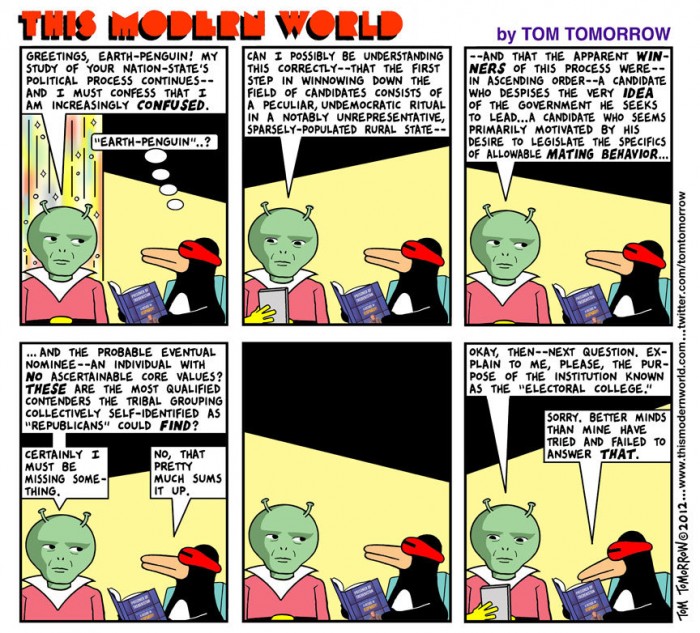So, how did we end up with such a screwed up political system in this country? It isn’t just the Electoral College, or the bizarre Republican primaries. We also seem to have the longest political campaigns in the world, and I’m sure we spend more money on these campaigns than anywhere else. And then there is the unexplainable way the media covers these elections — concentrating on the horse race, while almost completely ignoring any real issues.
Is there any possible help for us?



7 Comments
Fun cartoon.
Where the Media is thought to spend too much time on the election, I might mention that the first seven articles on this page, as I write this, are covering the election.
Election coverage is cheap, easy, and gets good ratings for the most part. They focus on the race and not the issues because the issues can be contentious and they don’t want to be labeled as pandering to one side or another. Besides, media is all for-profit, corporate-owned empires now anyway, so it is in their own best interests to ignore policies that would harm their business.
And no, the electoral college makes absolutely no sense in an age of instant information. In fact, it makes for some crazy election issues, like the 2000 general election, and the current re-districting stuff going on. Without the college, we wouldn’t have to deal with this kind of thing as much, and the whole process would be much simpler. But no one is going to challenge it because it was “laid down by the founding fathers”. Amazing how that excuse will be thrown around in some cases but not others…
In other words, simply “Follow the money.” The alien may or may not understand that.
Johnny Ro, did I say that the media was spending too much time on the election?
Political spending and campaigns is one of the few bright spots in our economy. Without that we would sink into depression.
Oh wait, the process itself is depressing.
Help is on the way.
The National Popular Vote bill would guarantee the Presidency to the candidate who receives the most popular votes in all 50 states (and DC).
Every vote, everywhere, would be politically relevant and equal in presidential elections. No more distorting and divisive red and blue state maps. There would no longer be a handful of ‘battleground’ states where voters and policies are more important than those of the voters in more than 3/4ths of the states that now are just ‘spectators’ and ignored.
When the bill is enacted by states possessing a majority of the electoral votes– enough electoral votes to elect a President (270 of 538), all the electoral votes from the enacting states would be awarded to the presidential candidate who receives the most popular votes in all 50 states and DC.
The bill uses the power given to each state by the Founding Fathers in the Constitution to change how they award their electoral votes for President. The presidential election system we have today is not in the Constitution. Historically, virtually all of the major changes in the method of electing the President, including ending the requirement that only men who owned substantial property could vote and 48 current state-by-state winner-take-all laws, have come about by state legislative action.
In Gallup polls since 1944, only about 20% of the public has supported the current system of awarding all of a state’s electoral votes to the presidential candidate who receives the most votes in each separate state (with about 70% opposed and about 10% undecided). Support for a national popular vote is strong among Republicans, Democrats, and Independent voters, as well as every demographic group in virtually every state surveyed in recent polls in closely divided Battleground states: CO – 68%, FL – 78%, IA 75%, MI – 73%, MO – 70%, NH – 69%, NV – 72%, NM– 76%, NC – 74%, OH – 70%, PA – 78%, VA – 74%, and WI – 71%; in Small states (3 to 5 electoral votes): AK – 70%, DC – 76%, DE – 75%, ID – 77%, ME – 77%, MT – 72%, NE 74%, NH – 69%, NV – 72%, NM – 76%, OK – 81%, RI – 74%, SD – 71%, UT – 70%, VT – 75%, WV – 81%, and WY – 69%; in Southern and Border states: AR – 80%,, KY- 80%, MS – 77%, MO – 70%, NC – 74%, OK – 81%, SC – 71%, TN – 83%, VA – 74%, and WV – 81%; and in other states polled: CA – 70%, CT – 74%, MA – 73%, MN – 75%, NY – 79%, OR – 76%, and WA – 77%. Americans believe that the candidate who receives the most votes should win.
The bill has passed 31 state legislative chambers in 21 small, medium-small, medium, and large states. The bill has been enacted by 9 jurisdictions possessing 132 electoral votes – 49% of the 270 necessary to bring the law into effect.
NationalPopularVote
Follow National Popular Vote on Facebook via nationalpopularvoteinc
Let’s see now. I think the bumper sticker (from Northern Sun; shameless plug) on my car sez: “Those who cast votes decide nothing. Those who count the votes decide everything. -Joseph Stalin” Don’t forget that, either.